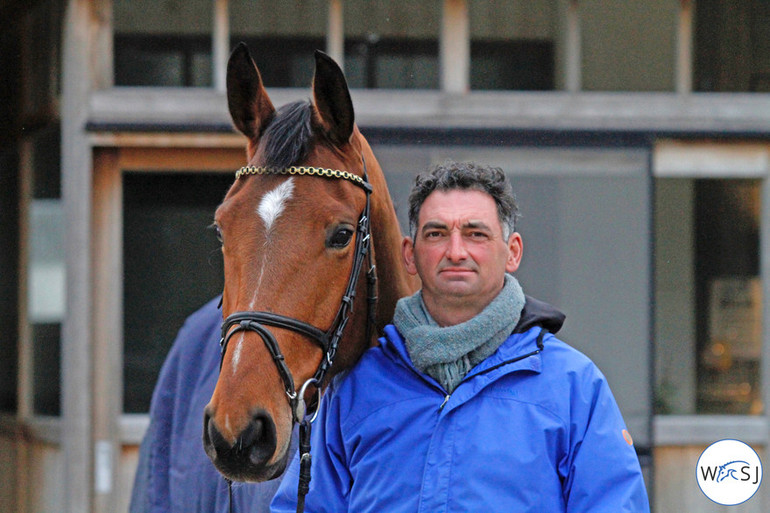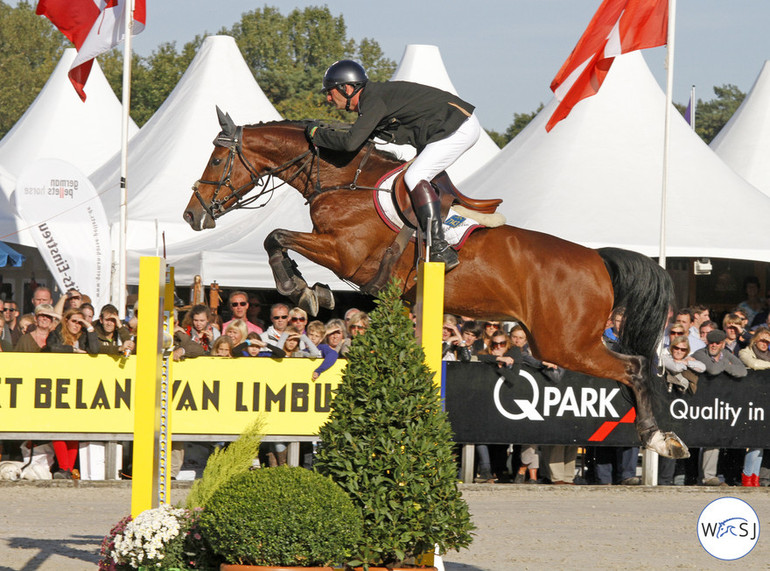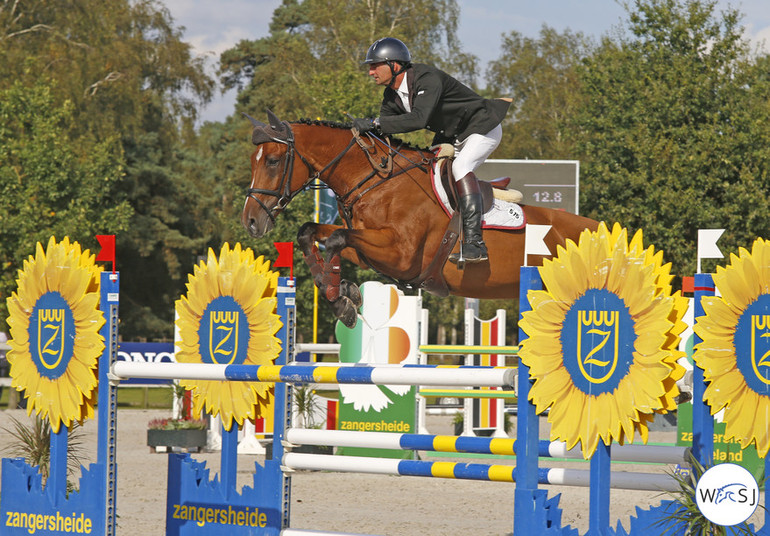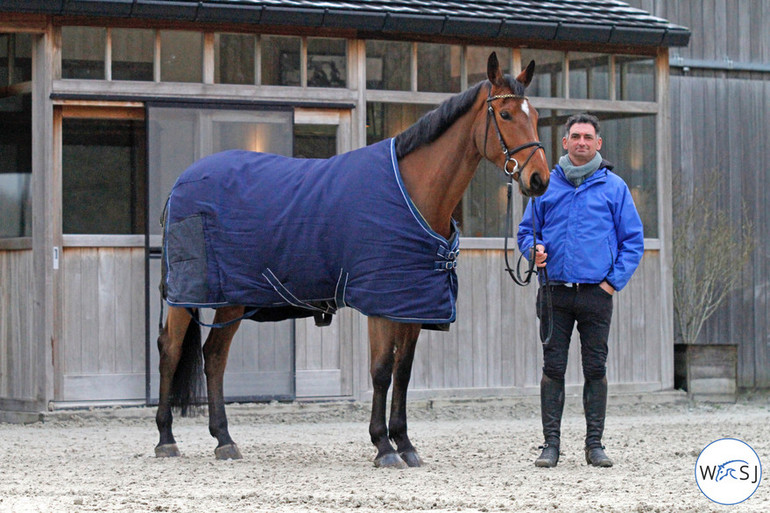Text © World of Showjumping by Nanna Nieminen
On Walter Lelie’s coffee table, there is a piece of paper with the Stephex Group’s logo on and the print ‘Dreams don’t work unless you do’. Over it, there is a handwritten note: ‘Thank you Walter!’ The writer of that note is Daniel Deusser, world number three and the current rider of Killer Queen VDM.
Killer Queen VDM (Eldorado vd Zeshoek x For Pleasure) has a common denominator with several other top horses such as Irenice Horta (Vigo D’Arsouilles x Diamant de Semilly), Eldorado vd Zeshoek (Clinton x Toulon), Gancia de Muze (Malito De Reve x Nimmerdor), Just the Music (Tornedo FCS x Quidam de Revel), Go Easy de Muze (Vigo d'Arsouilles x For Pleasure), Kontador VDM (Eldorado vd Zeshoek x For Pleasure) as well as many more – and his name is Walter Lelie. The 47-year-old Belgian rider has played an important part in producing many of the sport’s super stars.
Before a horse jumps into the spotlight at major international shows, many hours have been spent on them – far away from all the glitz, glory and champagne showers. Walter Lelie is one of many unsung heroes that has spent years and years on bringing horses up through the ranks, only to hand over the reins to someone else when the time to shine comes.
“We are talking about six to seven years of work,” Lelie begins. “I don’t mind the hard work; I don’t mind not being in the spotlight myself – but what I do mind is to spend time on riding horses that in my opinion are not good enough for high-level sport. Speaking for myself, I simply like riding good horses. For me, that is my biggest motivation. I get very excited about a good horse and when I find one, I try to keep it to myself for some time,” Lelie smiles.
“To produce horses for the top sport, you have to be a very good rider – and perhaps with little ambitions on your own behalf. And you need to know the value of hard work,” Lelie continues.
While Lelie follows many of his former four-legged partners, and likes to watch them do well – his focus is always on the future. “I don’t follow each horse that left my yard. I am not living in the past, I look forward to new horses,” Lelie tells. “When you are young, you dream about breeding a horse like Killer Queen. Now, that it has happened I tell myself that all I have to do is to do it again.”
Lelie has been surrounded by horses since his childhood, his parents had a riding school – which brought him in contact with horses from an early age. “When I was thirty, I got a job offer from Zangersheide,” Lelie tells about an opportunity that changed his life. “It was a big moment in my life; leaving the family business was a huge step. One of the main reasons I did it, was the fact that Jos Lansink was working at Zangersheide at that time. I believe that you need people in your life who change your way of thinking, and for me Jos was that person.”
“During my time in Lanaken, I got to ride very good horses. I enjoyed each day,” Lelie continues. “I learned a lot – from the way they managed their horses to how they run their business. I have a lot of respect for the Melchior-family.”
After two years in Lanaken, Lelie decided to start up on his own. “Obviously, I wanted to become a top rider,” Lelie recalls. “But I was always scared that if I would not succeed, I would end up with nothing. In my heart I wanted to try, but I knew how hard it was to make it. I think there is no point to try to be a successful rider just for the success. It is more important to enjoy what you do, and to follow your passion. I believe that if you are a good rider and really like your horses, the results will come – in one way or another. Along the way, I discovered that there are several ways to enjoy a good horse and good results.”
Part of Lelie’s challenge in reaching the top as a rider was that keeping a good horse was almost impossible. “The dilemma was: I wanted to go further in the sport, but I had to sell to make the business go around,” Lelie tells. “I often ended up selling the good ones I had to make it economically.”
In order to keep a small fraction of the exceptional horses that passed through his yard, Lelie started to do a bit of breeding. “From the beginning, I was lucky to have good mares such as Fortis Fortuna, Derly Chin de Muze and Gancia de Muze,” Lelie tells. “I started taking embryos, so that when I had to sell one of my good mares, I would not lose her completely. The genes would still be there for me to build on,” Lelie explains.
Today, Lelie’s main focus is on producing and selling horses. “I try to build up younger horses for the next level,” he tells. “I have 30 boxes, and most of the horses here are young – with some trading horses that come and go in between. I don’t want it to be too big, then you lose control,” he says.
From day one, Lelie prefers to do most of the work with his horses himself. “For me, it is really important. This way, I discover how they are,” he explains. “I want to see how the horses react over their first pole; if they are brave or shy, if they learn easily. Clever horses can do a lot in a short time, less clever ones not. In the first six weeks you can already discover a lot. I love to ride my horses myself, and I am showing every week,” he goes on to explain. “Obviously, I cannot do everything myself so I have some help also,” he points out.
When asked what he focuses on when working with his young horses, Lelie replies: “Balance is really important, and in general you want young horses to be well ridden. I never jump big, there is no point in doing that. I learned that from Jos.”
“They also need to keep confidence in their rider, you don’t want to break their hearts and their minds,” he says. “In my opinion, you have to respect the personality of the horse. They have to be treated the way they want to be treated.”
For Lelie, this also means to keep it as natural as possible for the young generation. “My horses look a bit raw. I don’t want them to be polished when they are at home. They get good food and they go a lot outside, and I prefer not to clip them in the winter so they can go without rugs in the fields. I try not to do anything special with them, but to really keep it simple,” he tells.
“I like to find the extraordinary parts in each horse,” Lelie continues. “Every horse, just like any human, has faults. If you only focus on the negatives, you will never find a good horse. At the start of each new partnership, I test the horses and then there naturally comes a point when I either believe in them or not. After that point, I don’t test them anymore; I just keep on working. For example, when you know your horse has scope, you don’t have to test it every week,” he says.
“In the end the quality of the horse is all that matters. I think many people are too fixated on the exterior of the horse. Sure enough, it is nice to have a beautiful and correct horse, but this is not important to me. For me, the instinct of the horse is what weighs more. That they have a brain and that they have power.”
“They have to give me a feeling of something special,” Lelie tells about how he sorts the extra-ordinary young horses from the more ordinary ones. “I cannot really put it into words; it is just this feeling I get. Sometimes, I also discover a horse through their children. Like with Emerald for example, I like him a lot because his offspring are unbelievable intelligent, they really want to fight for their rider and still they are sweet. Also, I like a freak in a horse – like Ratina Z. It is what is on the inside that matters the most,” Lelie concludes. “The things you cannot see in the horse are the most important; their brains, heart and power.”
“Even if other people might not see it, you have to try and see the special in each of them,” Lelie continues. “In the beginning of my career, I sometimes believed in the wrong horses. However, I think mistakes are also important – without them you cannot learn. In my opinion, you gain from everything – a bad deal can also be a good lesson.”
At the end of the day, Lelie’s work is all about horsemanship. “It is not a gift you are born with, it is something you learn every day,” Lelie points out. “Horsemanship for me means that you put your horse in front of your own ego. You have to know your horse, and feel and think ahead of it – you have to know how your horse is going to react. In my work, I also try to vision the things that are going to happen. I try to vision the career the horse can have. That is another kind of horsemanship.”
No reproduction without permission, copyright © World of Showjumping












